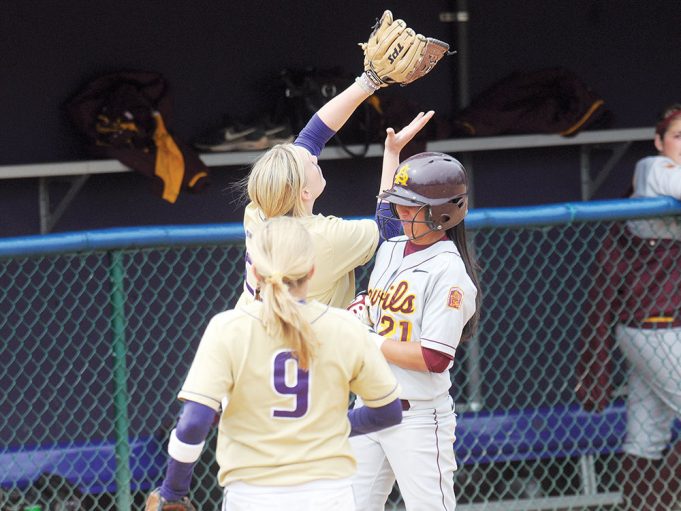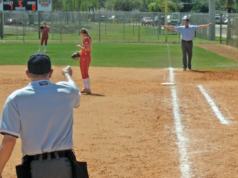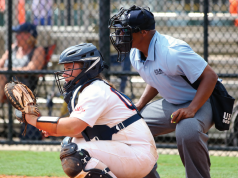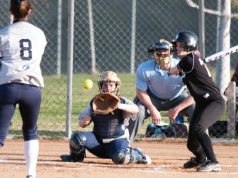What do you call when a runner jumps over an infield grounder as a fielder goes for the ball? Usually that play occurs when a runner moving from second to third leaps over a batted ball hit toward the shortstop. Is that interference? Or is it a no-call?
In the vast majority of those situations the runner has not interfered with the fielder, though the runner’s presence in the baseline may complicate the play for the fielder or screen her view of the ball.
Of course, that’s providing the runner was running the bases as expected and accepted. It is illegal for the runner to change her pace or time her running to hinder the fielder by coinciding her presence with the fielder’s attempt to play the ball. Contrary to belief by some, a runner is not required to run behind a fielder to avoid an interference call.
If a fielder stops and chooses not to field a ball because of a runner’s position in the baseline, interference has not occurred. However, interference is the call if a fielder gets near the ball and is hindered by the runner since the runner must vacate any area needed by a fielder who is attempting to execute a play.
When a runner jumps over a batted ball and does not interfere, the base umpire should extend his or her arms laterally with a safe signal. The umpire should hold the signal long enough to convey that the play was observed and that no violation has occurred.
A step and a reach.
When umpires gather, argument often rages long into the night. After a fielder boots a ground ball, is she still in the act of fielding a batted ball? Obviously, a fielder is in the act of fielding a batted ball when she misplays a ground ball. However, an accepted guideline maintains that she is still protected under the interference rule while recovering a booted ball, providing the ball is within a step and a reach of the fielder’s grasp.
If a fielder recovering a ball is within a step and a reach of her original fielding position, she is considered in the act of fielding a batted ball and an interference call is possible. In NCAA play, the ball must remain in front of the fielder and she must still have an opportunity to make a play for interference to occur.
If a batted ball bounds away more than a step and a reach from the fielder and contact occurs between the fielder and the runner, it could be judged as a no-call. Obstruction by the fielder is the call if the fielder illegally impedes the progress of the runner. Interference still can be called if the runner hinders the fielder who is recovering a loose ball when the runner could have avoided doing so.
Interference with a thrown ball.
In the early 1800s, a baserunner in baseball was called out when struck by a thrown ball. Thankfully that has changed and a runner is no longer out when hit by a thrown ball. In fact, with one rule code’s exception, a softball baserunner is not out unless she intentionally interferes with a thrown ball. Curiously, in 2007, USA Softball removed the word “intentionally” from its thrown-ball rule. All other softball codes declare a runner out only if she intentionally interferes with a thrown ball.
USA Softball wants its umpires to judge a runner’s interference with a thrown ball based on the umpire’s judgment of interference and not according to the runner’s intent.
A solid guideline for all games is never to call a baserunner out for interfering with a thrown ball when the runner, running normally in her established basepath, is struck by a thrown ball. Conversely, a runner in any game who intentionally interferes with a thrown ball should be declared out with the ball becoming dead.
Interference should not be called when a fielder withholds a throw in fear of striking the baserunner when the runner is running away from the fielder. Interference can be called when a fielder withholds a throw because of the position of a retired runner when the retired runner is running toward the fielder and the runner had a reasonable opportunity to slide or get out of the way. That play commonly occurs when a forced-out runner goes into second base standing up.
Interference should not be called when a runner forced out at second pops up after her slide when the fielder is not attempting to play on the batter-runner at first. However, if the fielder is trying to throw to first, a pop-up slide that alters the play of the fielder is interference. When a retired runner interferes in that way, the runner closest to home is also out. In some situations, the runner closest to home could be the batter-runner.
What's Your Call? Leave a Comment:
Note: This article is archival in nature. Rules, interpretations, mechanics, philosophies and other information may or may not be correct for the current year.
This article is the copyright of ©Referee Enterprises, Inc., and may not be republished in whole or in part online, in print or in any capacity without expressed written permission from Referee. The article is made available for educational use by individuals.


















